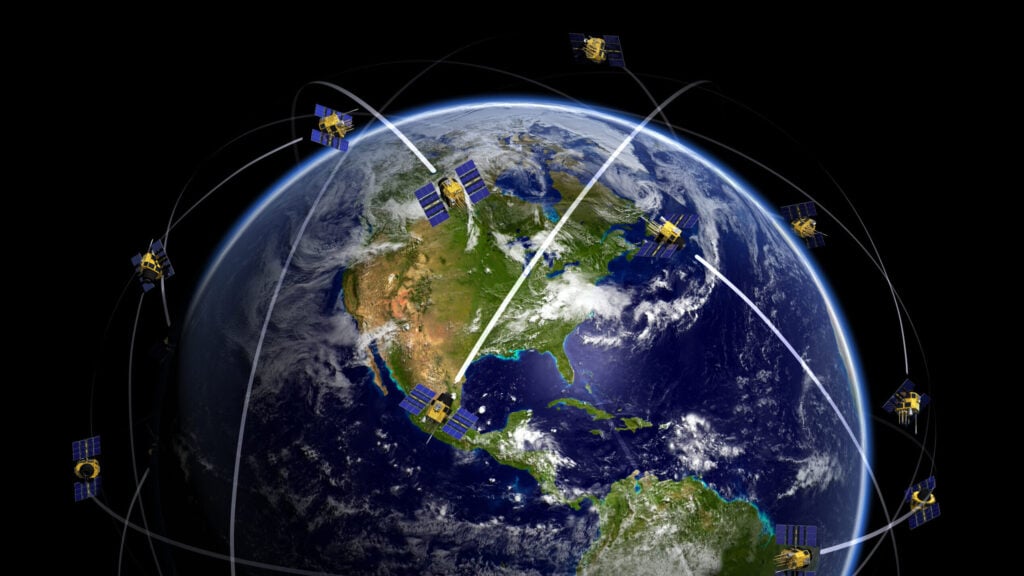Land Warfare, Naval Warfare, Networks / Cyber, Space
Ground system for jam-resistant GPS delayed again to July 2025 at earliest, Pentagon tester says

The GPS constellation that provides positioning, navigation and timing signals to the US military and civilians around the world, is made up of 31 satellites. (BlackJack3D/Getty Images)
ORLANDO — The long-troubled ground system needed for the Space Force to have “full control” of the jam-resistant, military-only GPS signal is facing yet another delay — and now won’t be ready for use until July 2025, according to the latest report by Pentagon’s testing office.
The Next-Generation Operational Control System (OCX) is facing a new delay of 16 months, according to the 2023 Annual Report of the Director of Operational Test & Evaluation (DOT&E).
“This 16-month delay is in addition to last year’s reporting of a 9-month delay from the FY21 Annual Report. The Space Force plans to operationally accept OCX in July 2025,” the report says.
“As reported over the course of several years, ongoing development delays of the Next Generation Operational Control System (OCX) are continuing to delay full operational control of the U.S. Space Force’s GPS modernized civil, Military Code (M-code), and navigation warfare functions and the fielding of operationally acceptable M-code capable receivers. These delays increase risk that U.S. and allied warfighters will be unable to conduct successful operations in future contested environments due to the lack of access to modernized GPS position, navigation, and timing (PNT) information,” it adds.
The M-Code now can be broadcast by most of the 31 GPS satellites on orbit, but is available for use to only a small number of military personnel due to both the OCX issue and a lack of radios and receivers equipped to access it. The Space Force has a two-pronged effort, called the Military GPS User Equipment (MGUE) program, underway to develop new computer chip-carrying cards to retrofit existing platforms, such as aircraft and ships, so they can ingest M-code signals, as well as to develop a new handheld receiver. But that effort has also experienced delays, according to a June 2023 report by the Government Accountability Office.
This year’s DOT&E report notes that because of the delays in the development of the MGUE receiver cards, the Army and Marine Corps instead are now buying commercially developed receivers capable of ingesting the M-Code for fielding with ground vehicles. The Air Force’s B-2 bomber and the Navy’s Arleigh Burke-class destroyer also are likely to experience testing delays because the MGUE receiver cards designed for those platforms are experiencing problems with both hardware and software, the report adds.
In addition, the DOT&E report cautions that because the OCX software is supposed to be the basis for an upgraded system, OCX Block 3F, designed to control the planned next-generation of GPS satellites called GPS IIIF, that effort also is likely to be delayed. The Space Force currently intends to launch the first GPS IIIF satellite in fiscal 2027, it says.
OCX, under development by RTX (formerly Raytheon) had a stormy history, to say the least — including a serious Nunn-McCurdy breach back in 2016 that drew the wrath of Frank Kendall, then DoD acquisition czar and now Air Force secretary. OCX was originally supposed to become operational in the 2011 to 2012 timeframe.
Back in January, Air Force head of space acquisition Frank Calvelli had dubbed OCX one of the handful of flailing software programs that have been “albatrosses” weighing down the Space Force for decades. In November, he sounded more optimistic about progress, saying he expected that the program would finally go into operation this summer — a hope the the DOT&E report categorically dashes given the development delays and lack of required testing of the how the satellites, ground control systems and receivers work together.
“No operational testing was conducted in FY23 across the GPS Enterprise. The OCX cyber assessment that was scheduled for August 2023 has now been delayed until [FY24’s fourth quarter]. The GPS Enterprise IOT&E [Initial Operational Test & Evaluation] that had been scheduled to commence in [FY23’s fourth quarter] has now been delayed until FY26,” the DOT&E report concludes.